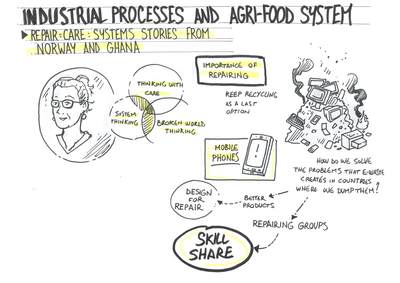Repair = care: system stories from Norway and Ghana
Van der Velden, Maja and Geirbo Hanne, Cecilie (2018) Repair = care: system stories from Norway and Ghana. In: Proceedings of RSD7, Relating Systems Thinking and Design 7, 23-26 Oct 2018, Turin, Italy.
Preview |
Text
VanderVelden_Slides_2018.pdf Download (8MB) | Preview |
![VanderVelden_MindMap_2018.jpg [thumbnail of VanderVelden_MindMap_2018.jpg]](https://openresearch.ocadu.ca/2700/2.hassmallThumbnailVersion/VanderVelden_MindMap_2018.jpg)  Preview |
Image
VanderVelden_MindMap_2018.jpg Download (321kB) | Preview |
Abstract
Sustainable production and consumption is one of the seventeen Sustai- nable Development Goals (SDGs) (United Nations, 2015). The mobile phone is an important example of unsustainable production and consumption. There are widespread social and environmental impacts in its life cycle (van der Velden & Taylor, 2017) and the production and consumption of mobile pho- nes continues to increase, also in countries with a highly saturated market. In 2017, 1.47 billion mobile phone units were shipped worldwide and that number is expected to reach 1.7 billion units in 2020 (Statista, 2018).
Repair is one of the activities that disrupt the unsustainable consumption of mobile phones. Repair extends the lifespan of a product, which slows down unsustainable product life cycles. Through stories of the repair of mobile phones, from Norway and Ghana, we are able draw a global system of mo- bile phone production and consumption, which can offer insight for a more sustainable mobile phone life cycle.
The number of places where one can repair shoes, clothes, electronics, etc., after the warranty period has expired, has decreased dramatically in high- income countries such as Norway. Also when one brings a faulty item back during the warranty period, the item is most often not repaired, but replaced. As a result of increased awareness of the impact of unsustainable consumption, several community-based repair initiatives have spring up in high-income countries, such as the Restart Project in the UK (The Restart Project, 2018) and Repair Café in the Netherlands (Repair Café, 2018), both with affiliates around the world. The Restart project focuses on the repair of electronics. Restarters Norway, which is one of their affiliates, organises so-called repair parties for electronics (Restarters Norway, 2018). Repair Cafés offer all kinds of repairs, based on the availability of skills among their volunteers. Electronics, bicycles, and clothes are some of the most popular items.
Community repair is based on voluntary participation of repairers, who come together in a local setting, such as a community centre or library, to repair whatever people bring in. The meetings are organised by and for the local community. Community repair is often motivated by sustainable con- sumption or the unavailability or unaffordability of formal repair, but also the culture and joy of repair plays a central role.
In low-income countries, repair has always been an important household activity as well as economic activity. Our fieldwork on informal mobile pho- ne repair in Ghana shows that repair is a collective activity; colleagues, ma- ster repairers, and apprentices work together, sharing tools and expertise.
Rather than comparing informal repair activities in Norway and Ghana, we propose to tell system stories of mobile phone repair in both countries. Sy- stem stories have the capacity to shift the focus from parts of the system to the whole system (Stroh, 2015). They are part of what Ison calls a systemic inquiry, “a particular means of facilitating movement towards social lear- ning (understood as concerted action by multiple stakeholders in situations of complexity and uncertainty)” (2010, p. 244).
We understand repair as a “doings of care” (de la Bellacasa, 2011). Our repair stories focus on the material aspects of the mobile phone. We follow the mo- bile phones and its spare parts to the places where they are repaired and we focus on the repair process itself, by looking at the tools and resources (manuals, spare parts) used for repair. Using system mapping (Stroh, 2015), we can draw global flows of materials as well as the structures that regulate these flows, such as national, EU, and international regulation, and consu- mer practices.
System stories and system mapping are important tools in addressing com- plex problems, such as those of addressed by the SDGs. By focusing on re- pair, an activity disrupting the business as usual of unsustainable cycles of production and consumption, we are able to shift the focus towards the system as whole. By mapping global flows of materials, we are able to iden- tify what is “systemically desirable” (P. B. Checkland, 1999; P. Checkland & Winter, 2006) in terms of possible actions that will strengthen repair as an intervention in unsustainable production and consumption. We identify product design for reparability, the free and affordable availability of quali- ty spare parts, and zero value-added taxes on repair and spare parts as desi- rable actions for caring about mobile phones and other things.
| Item Type: | Conference/Workshop Item (Paper) |
|---|---|
| Uncontrolled Keywords: | Care, Design for reparability, Repair, Sustainabilitym System stories, System mapping |
| Related URLs: | |
| Date Deposited: | 24 Jun 2019 17:38 |
| Last Modified: | 20 Dec 2021 16:16 |
| URI: | https://openresearch.ocadu.ca/id/eprint/2700 |
Actions (login required)
 |
Edit View |

 Lists
Lists Lists
Lists